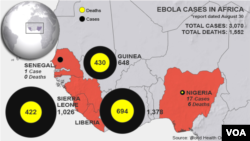U.N. Secretary-General Ban Ki-moon said Friday that the world deliberative body is establishing an Ebola crisis center with the goal of stopping transmission of the virus in affected countries within six to nine months.
Ban said the U.N. is mobilizing in every way to stop the spread of the virus, which has killed more than 2,000 people (2,097) in Guinea, Liberia, Sierra Leone and Nigeria with its hemorrhagic fever-like symptoms.
He said the U.N. is sending out an international “rescue call,” asking for $600 million for supplies needed in West Africa.
“The number of cases is rising exponentially," he said. "The disease is spreading far faster than the response. People are increasingly frustrated that it is not being controlled.”
Ban spoke to reporters briefly after meeting with the World Health Organization chief, Dr. Margaret Chan, Dr. David Nabarro of the United Nations and other senior U.N. officials.
The secretary-general said the next few weeks would be crucial in getting more supplies and medical personnel to the affected countries. He urged airlines and shipping companies not to cancel flights, saying that will not halt the spread of the disease, but would keep medical teams from reaching the people most in need.
“It is crucial to remember that Ebola can be avoided and controlled," he said. "The virus has been contained elsewhere in the past, and we can do it today as well. We know what to do and what needs to be done.”
WHO says the risk of Ebola transmission is low. Becoming infected requires direct, physical contact with blood or other body fluids from a person who has the virus, or from a victim's body. There have been nearly 4,000 confirmed cases of Ebola cases in the four West African countries.
Although Ebola is a “huge, serious challenge,” Ban said, he is convinced of success, provided there is enough assistance from the international community.





